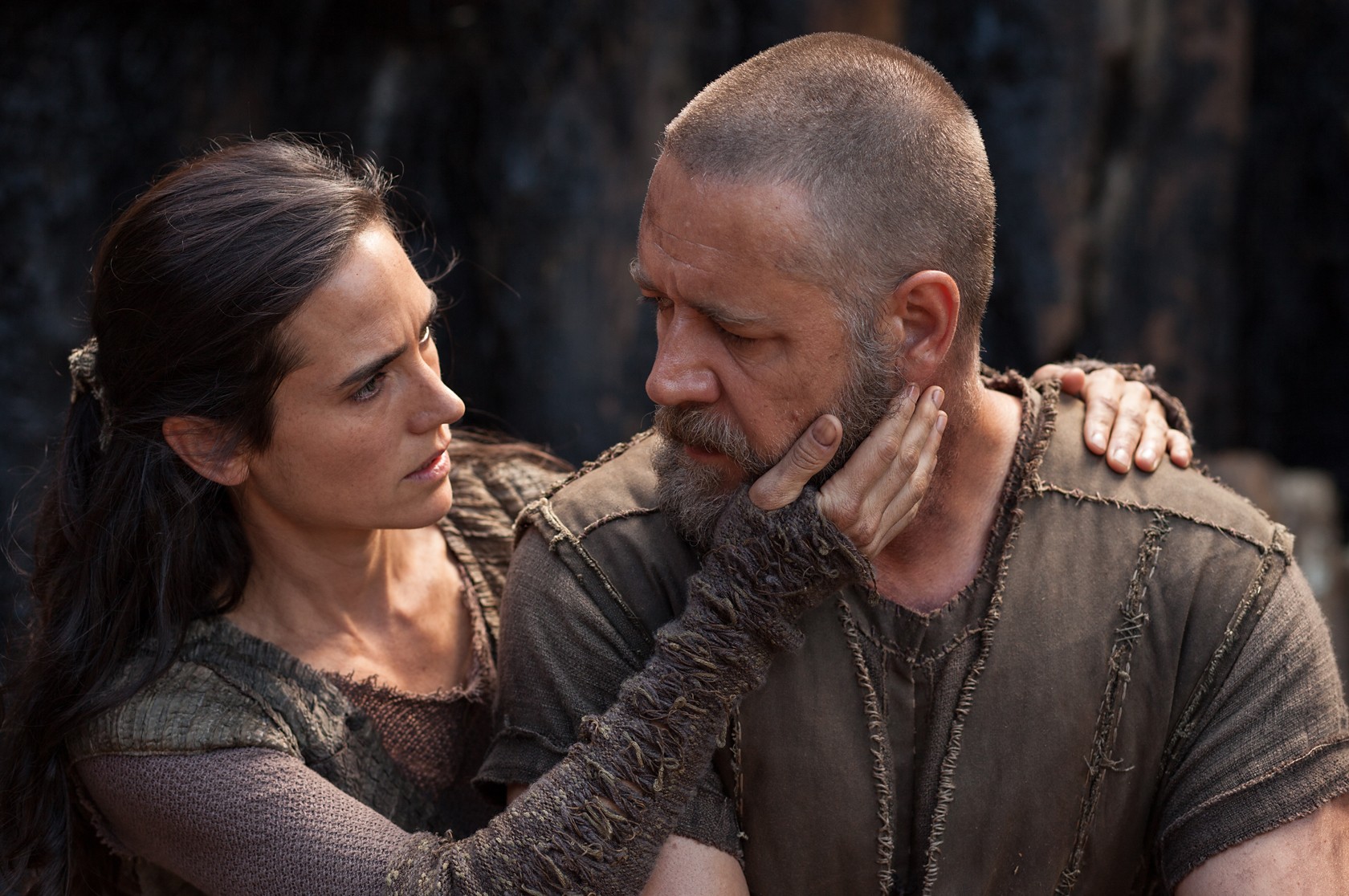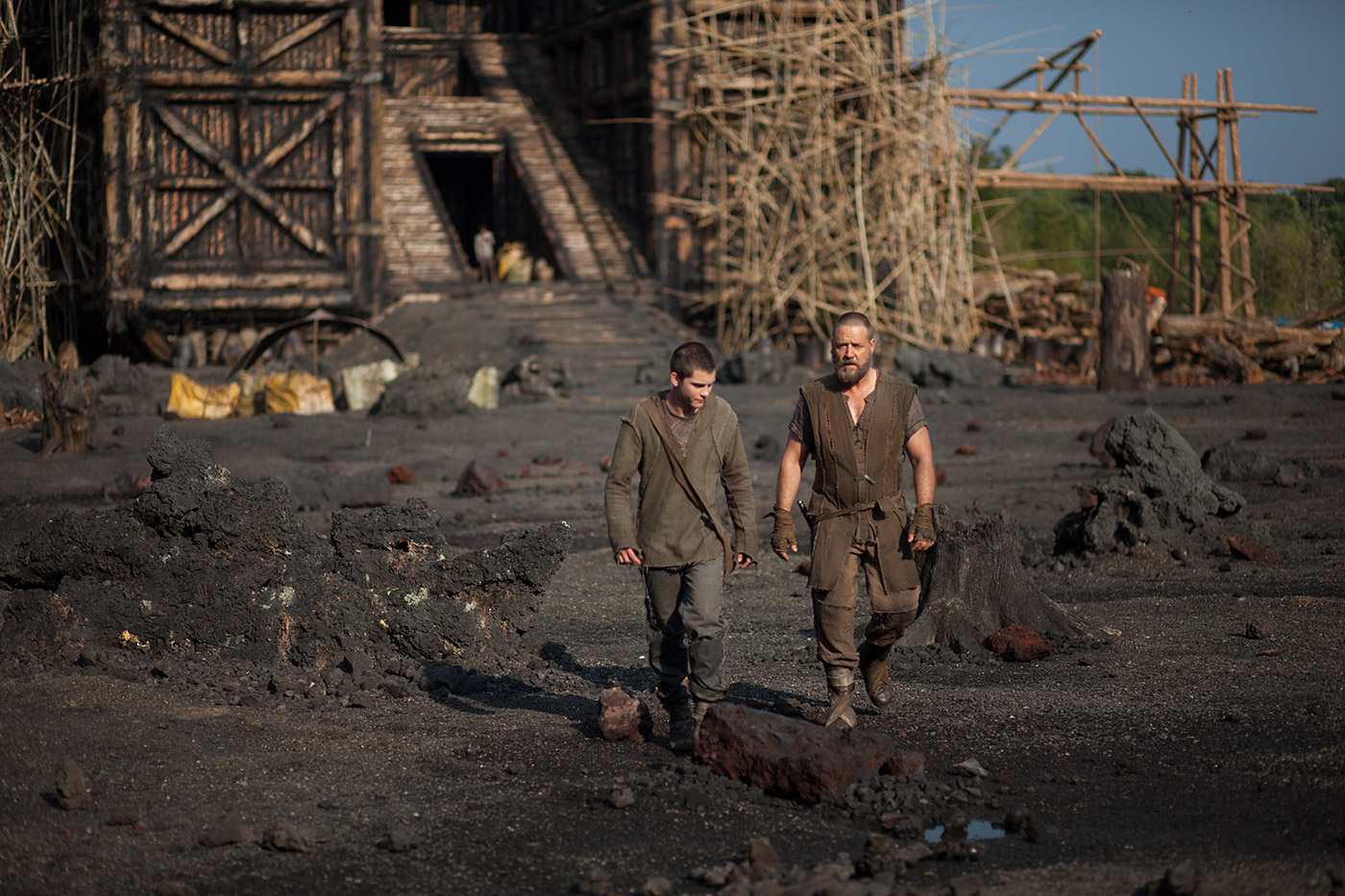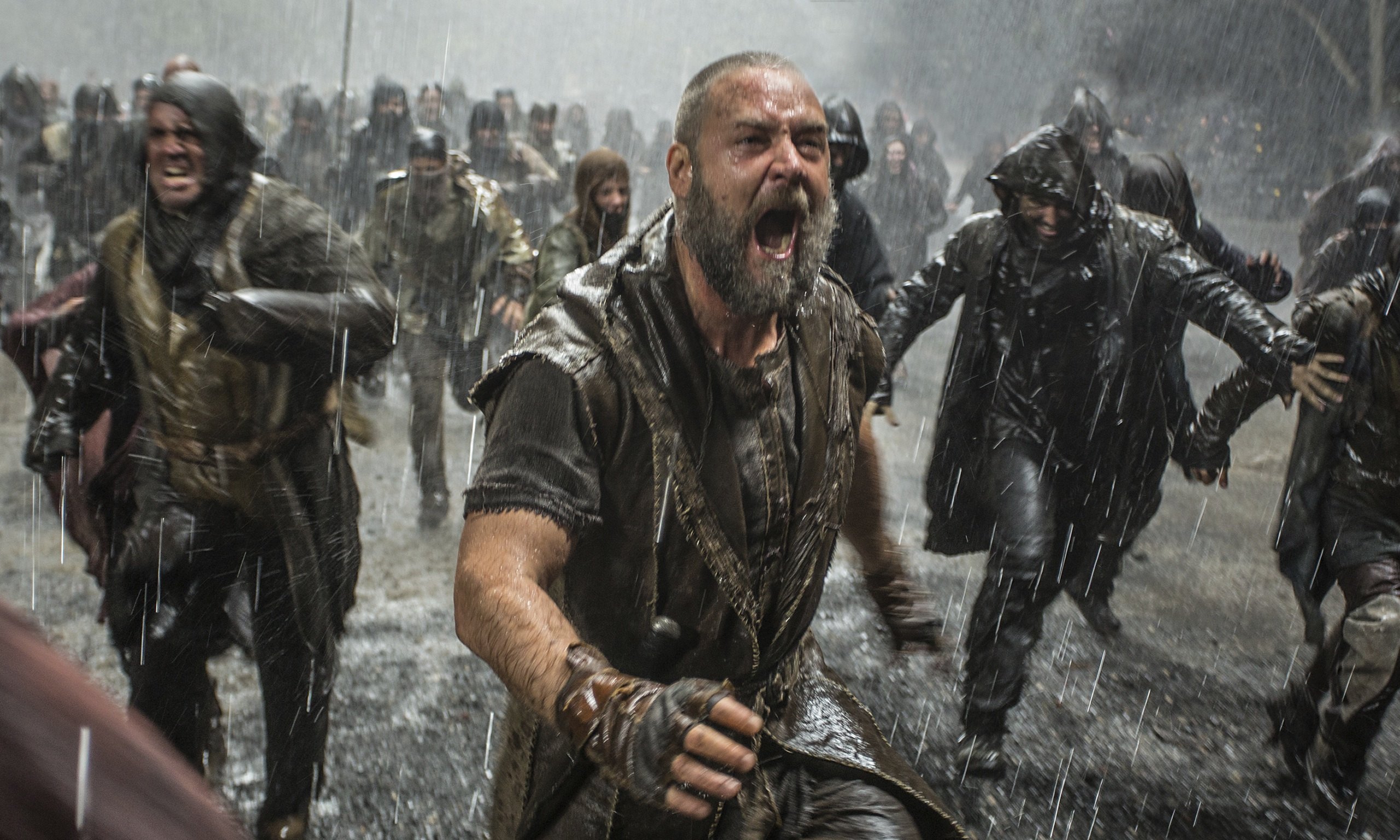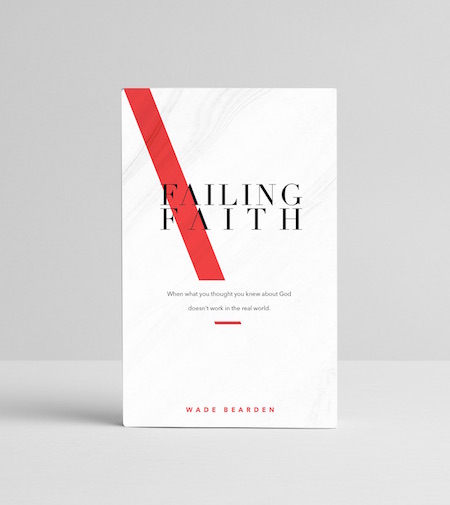
Noah is a film I have looked forward to for some time. My previous blog about the movie (Noah Might Not Be Biblical, But That’s Okay) is by far my most popular article to date. Most liked it. Some disagreed. Some agreed, saw the film, and then disagreed.
As I begin this review, I want to point out a few particulars. Some of you are likely to disagree with me. No worries. Use the comments section. I just ask that if you are going to dialogue with my perspective, you need to read the whole review first. If you only look at the section where I provide my brief conclusions regarding the movie and then tell me how I’m wrong, you’re just being lazy. Forgive me if I sound harsh, but it’s true. Whether you disagree with me or not, we can still be friends. We just need to make sure we discuss the film responsibly.
There will also be spoilers. I know you think I’m being funny. Nice Wade, next you’re going to tell me that Jesus rises again at the end of Son of God. I’m serious, there really are spoilers. You are warned.
Okay, here we go.

If you’re expecting a strict, biblical recap of the catastrophic flood detailed in Genesis, you will hate this film. If you’re expecting a feature that shakes up Noah’s narrative—shifting around details to make a point or create tension—while still retaining the themes embedded in the story, you will appreciate Noah. You might not hail Noah as a cinematic masterpiece, but you will appreciate the movie for what it’s worth.
I fall into the second category.
What is Noah Like as a Film?
Technically speaking, Noah isn’t a perfect film by any means. The cinematography is beautiful and the acting is stellar, but the storyline suffers from a lack of direction. It’s an apocalyptic catastrophe, a love story, a father-son drama, an action film. In the end, it loses a bit of identity because it doesn’t focus on an identity.
Yet, I can’t help by be emotionally moved by Darren Aronofsky’s work. There are a number of tense moments, including a few beautifully orchestrated action sequences. Theology aside, this is high-grade art. Take the Noah label off and it’s still a movie I’d recommend. It’s no masterpiece, but it’s a good film.
Okay, okay. I know what you’re thinking now. Who cares about all the technical stuff Wade, let’s get down to the nitty gritty.
Is Noah redeemable? Does it stray too far from the Genesis narrative? Is it Harry Potter all over again?
Why the Changes?
Overall, Aronofsky’s Noah retains the main building blocks of the Genesis story (big flood, ark, people die, etc.), while adding, moving, and reimagining the minor details. Some additions are necessary. You can’t make a compelling two hour film with four chapters from the Bible. In Genesis, Noah only has three verses of dialogue and that’s after he’s gone on a bender. Details must be added. This is true of The Passion of the Christ and Son of God.
In Aronofsky’s own words, Noah has much in common with a typical Jewish midrash. A midrash “is the body of homiletic stories told by Jewish rabbinic sages to explain passages in the Tanakh. Midrash is a method of interpreting biblical stories that goes beyond simple distillation of religious, legal, or moral teachings. It fills in gaps left in the biblical narrative regarding events and personalities that are only hinted at.” This definition goes a long way in deciphering Noah.
The main conflict then, is whether the new/tweaked details conflict with the book of Genesis and/or depict an anti-Christian worldview.
Genre has everything to do with the discrepancies we see on screen. Noah is less a Bible movie as much as it is a Bible story recreated into a fantasy epic. It’s Genesis meets Lord of the Rings. Aronofsky takes the overall structure of the story, adds in a dose of creativity, and then mixes it up in a blender to create something that’s both unique and ancient.
For instance, the Nephilim (Watchers) are portrayed as fallen, rocklike angels who help Noah build the ark. There’s a wide variety of views regarding just what the author of Genesis means by “Nephilim” (6:4), but I think it’s safe to say that they probably didn’t talk like Optimus Prime.
We also catch a few glimpses of Methuselah (played by Anthony Hopkins). Some have written off Methuselah’s character as a “witch doctor” or “sorcerer.” I’m not so sure. We’ve all seen a televangelist or two display these characteristics in their ministries. In one scene, Methuselah touches a boy’s head, causing him to pass out. In another, he places his hand on a woman’s stomach to heal her infertility. Methuselah seems to be operating under God’s power, but some Christians might find his character a bit of a stretch.
These details are used to bring a fantastic, almost mythical element to the story. Other plot points, like the villain who hammers his way into the ark and then spends months hidden among the animals, are added to create tension and make the boat ride a little less boring.
As a Christian, some of these details bothered me a bit. I think it’s because I’ve grown up hearing the Noah story since childhood. This is different. Foreign. Then I remembered I was watching a fictional version of what I believe is a nonfiction story. Aronofsky is a filmmaker. A storyteller. His priority to craft a compelling narrative trumps his desire to create a straightforward documentary. If we want an accurate portrayal of the Genesis narrative, we can rent Evan Almighty like everyone else.
Forgive me for being facetious.
Sure, there are aspects of Noah that are not biblical. Then there are pieces of the story that could be biblical. We just don’t know.
Environmentalism
There’s also been a great deal of fuss made over Noah’s perceived environmental agenda. Does Aronofsky sacrifice a story of redemption, justice, and mercy to spread a crusade of green? Before we jump into the details, it’s important to note that God, as described in scripture, is a “green” God.
After creation, God commanded humanity to rule over the earth. This privilege comes with an imperative: “take care of it” (Genesis 2:15). The word used for “care” here literally means to keep or preserve. He also says to “Be fruitful and multiply and fill the earth and subdue it” (1:28). God has made us “managers” of the environment. A good manager takes care of what they’re given. A bad manager serves cold French fries.
Noah depicts a violent, corrupt world. Humanity’s wickedness has overflowed into a misuse of both nature and the animal kingdom (Note: God doesn’t give humans permission to eat meat until after the flood—Genesis 9:2-3).
Though the Bible doesn’t individually list out all of society’s sins (besides the general categories of violence and corruption), one might argue that the misuse of the environment could have made the list.
In some ways, the earth is also a visual metaphor for what is happening in the heart of man. They are scorched to the core. Once again, Aronofsky is using art to convey meaning.

Is Noah a Bad Guy?
The biggest controversy surrounding the film—that I’ve read anyway—is Noah himself. While in the ark, Noah becomes consumed with the idea that all of humanity must be destroyed. His family will be the last to walk the earth. He’s even willing to kill to make this idea a reality.
According to Noah, every human deserves to be punished. No one is good. In one conversation with his wife, Noah goes as far as detailing the faults of each member in their family. For true justice to be done, humanity must be decimated.
Biblically, here’s what we know about Noah’s character:
1. He isn’t a perfect man (the Bible makes it clear that no one is without sin)
2. Following these standards, Noah is only “a righteous man, blameless in his generation” (Genesis 6:9) on the basis of his covenantal relationship with God.
That’s it. Noah could have struggled with anger, lust, or selfishness. We do know he had an affinity for wine and nakedness (Genesis 9:21). As Christians, we understand all too well what it’s like to wrestle with negative aspects within our behavior. Aronofsky emphasizes this point by turning Noah into a living, breathing person complete with love, sympathy, and yes, even a few warts. Did Noah really go insane on the ark? We’re not sure.
Noah’s Greatest Contribution
Okay, now we’ve reached the climax of the piece.
Give all of these factors, does Noah stay true to the overall theme and message of the flood narrative?
Here is a synopsis of the biblical story itself:
God takes evil seriously and chose to judge humanity for their sins by sending a catastrophic flood. On the basis of his relationship with God, Noah is saved from judgement.
Despite all its deviations from the biblical text, does Noah still teach this lesson?
Yes.
The film makes some interesting, and rather bold, statements regarding God’s judgment of evil. All of humanity has turned away from God (even Noah and his family). They deserved to be judged for their sins. This is tough for us as modern audiences to swallow. We cringed at Noah’s insanity. We are troubled by the people clinging to get on the ark. We know justice must be done, but we fear it.
Noah understood this important piece of God’s character. That is why he is willing to kill his grandchildren.
Noah is, however, missing one thing: mercy. God shows mercy to individuals on the basis of their covenantal relationship with him. Noah slowly realizes this important truth toward the end of the film.
Noah also wrestles with the reality that to us, God sometimes seems silent. As David reflects in Psalm 22:
“My God, my God, why hast thou forsaken me? Why art thou so far from helping me, and from the words of my roaring?
O my God, I cry in the day time, but thou hearest not; and in the night season, and am not silent.” (1-2)
This is an important theme Aronofsky (and his version of Noah) tackles throughout the film. In the end, we find that God hasn’t forgotten Noah. He is silently working in the background, though Noah doesn’t always see it.
This is a weighty film that forces us to dig deep into a heavy story. In one poignant shot, a group of survivors are desperately clinging to a large rock, attempting to escape the rising water. Noah hears their cries from inside the ark, but does nothing. As Christians we’ve often viewed the biblical story of Noah as a lighthearted Sunday school lesson. While ultimately a lesson of hope, it is an extremely dark narrative. In Noah, the viewer can’t hide from the ramifications of justice and punishment.
I might disagree with some particulars of Noah, but I can agree on these issues.
So What Now?
You don’t have to like Noah. If its deviations from the biblical text upset you, don’t watch it.
Here’s what I encourage you to do though. Use Noah as a tool to help others understand the faith. Aronofsky critically examines what we as humans instinctually understand: evil is imbedded inside all of us and we can’t survive the storm alone. We are all in need of mercy. Don’t make your friends, family members, or neighbors feel like they must possess a detailed, biblical account of the flood before they can accept God’s grace. Take a film that’s not always biblical and help someone understand God better.
Here are the six ways we can do this (as outlined in my previous article):
1. Don’t Overreact
Can we disagree with some of the content? Of course. Should we stir up an online frenzy? Probably not.
2. Use Noah as a Catalyst for Religious Conversation
You don’t have to agree with everything in the film, but you can use it as a launching pad to discuss topics like sin, divine judgement, and redemption.
3. Don’t Throw Away the Good
Don’t discount the entire film because certain particulars diverge from the Genesis narrative. Be willing to admit what it did well and what it did wrong.
4. Do Your Research
Dig deep into the story of Noah. Know the details.
5. The Bible is Messy
The Bible is grim, it’s gritty, and it isn’t always kid-friendly. Noah’s story is a dark one.
6. Recognize Good Art
Recognize the artistry of Noah. While the worldview may be off, there still might be much to appreciate.
Okay. That’s all I have. Let the conversation begin.




